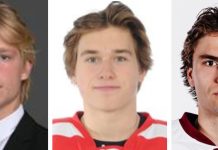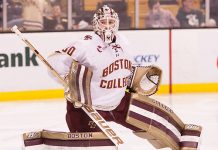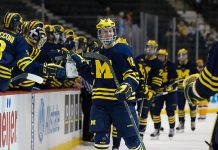Matt Gilroy, welcome to the club.
No, not the Hobey Baker winners. This group is even more elusive than that one.
In the first 28 years of the Hobey Baker Memorial Award, only four players have won the Hobey and the NCAA title in the same season: Tony Hrkac at North Dakota in 1987, Lane MacDonald at Harvard in 1989, Paul Kariya at Maine in 1993, and, most recently, Jordan Leopold at Minnesota in 2002.
Saturday night, Gilroy became the fifth member of that elite group, although to hear him after BU’s national championship win over Miami, that was – as it should be for any hockey player worth his salt – the furthest thing from his mind.
“I wouldn’t have won anything this year if it wasn’t for the team I was on,” Gilroy said. “My co-captains John McCarthy and Brian Strait did an unbelievable job, and what we did as a team was why I won the Hobey Baker.”
Now, the fact of the matter is this: the story of this night is not about Matt Gilroy. What happened on Saturday night at the Verizon Center was never going to make Gilroy any more or less worthy a Hobey Baker winner. There are certainly players that we have come back to and questioned over the years as to whether they deserved to win the Hobey. Matt Gilroy will not be one of them.
However, to see Gilroy reach even more rarified air raises the question: why are there so few? Why have only five players in nearly 30 years accomplished this feat?
Part of it, of course, is the simple fact that, as Brendan Morrison so infamously said, “The best team doesn’t always win.” Now, he’s taken a lot of flak for saying that – there is such a thing as timing, after all – but it’s absolutely true. Just ask Notre Dame: you can make a great argument that the team that lost to Michigan State at the Midwest Regional in 2007 and the team that lost to Bemidji State this year were better teams than the team that made it to last year’s national championship game.
Jack Parker touched on it when he said, “The teams that are supposed to win this tournament, most of the time, don’t. They think they had a great year, and they come in as the No. 1 seed, but the team that plays great in March and April is the team that wins the tournament.”
Having a player like a Matt Carle, or a Ryan Miller, or a Brendan Morrison can certainly contribute to the feeling that you’re going to win a national title…although great coaches like George Gwozdecky, Ron Mason and Red Berenson know perfectly well that it takes more than that.
Another element is the way that the Hobey is awarded. I’ve written about it at length this season in regards to Colin Wilson: he didn’t score the number of goals necessary to win the Hobey as a forward. That may not be fair – in fact, it probably isn’t – but the Hobey Baker voters have a history of liking forwards who score lots of goals. Forwards who score lots of goals don’t necessarily play on teams that have the balance to go far in the NCAA tournament.
In that sense, it makes sense that Matt Gilroy is joining Leopold, Kariya, MacDonald and Hrkac in that elite group, because he didn’t win as a numbers guy. He won as a two-way defenseman who had an outstanding four-year career, turned down more than 20 pro contract offers last summer, and came back to lead his team to the Frozen Four as one of the best captains in BU history. Players like that are key members of championship teams, so it’s only fitting that this man is one of those.
In the end, though, the answer to why there aren’t more of these guys, is much simpler than that.
“I think it’s hard to do either one of those things, period,” Parker said. “And, therefore, to double up in the same season is a real difficult task. I say this all the time. People don’t understand unless you’re in the trenches how difficult it is to win the national championship.
“And then, people don’t understand how difficult it is for people’s opinions – a lot of sports writers, a lot of different coaches and a lot of different people to vote get in the Hobey Baker. How they come up with who is the best player in the nation is a hard thing to do. It’s a hard thing to win. You’ve got two very, very difficult things to do. To place them both in the year doubles up the odds.”
Really, in the end, it makes all the sense in the world: winning the biggest thing you can as an individual and as a team in college hockey is about as difficult as it gets in college hockey for any one player.
Whether Matt Gilroy turns out to be one of the greatest players ever to play college hockey remains to be seen; he’ll certainly be well-paid in the near future, and what happens after that…well, we’ll see. However, after this season, there’s no doubt that he deserves to be remembered as one of college hockey’s all-time greats.
Goodnight from the Verizon Center.


